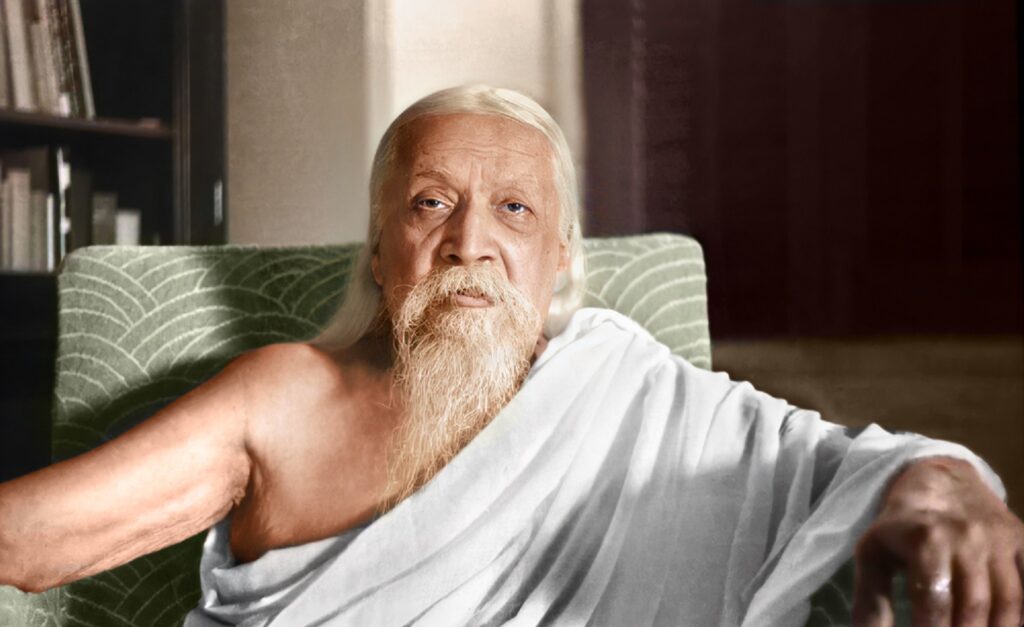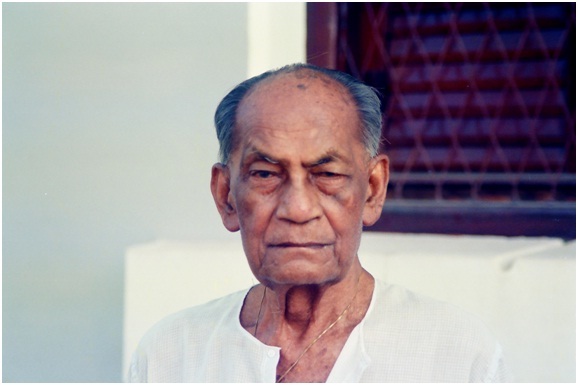
An exercise-book came to my hand bearing on the cover the impressions of King Edward VII and his queen. Against the title was written “Record of yogic details” in Sri Aurobindo’s hand in the month of June 1913. The cover of the book has undergone a big change through the long process of time: it has turned dull brown with a few worm-holes here and there.
When I opened the book, the very first page made me extremely curious. With great surprise I read entries of some accounts by Sri Aurobindo. Here are one or two examples:
June 1913
Credit June 1st (May 31st)
Rs. 15.00 (Rent for May) Rs. 15
Rs. 40.00 in notes
Rs. 28.00 (Rent and servant for June)
Rs. 20.00 reserve
Rs. 7.00 Rs. 85
Rs. 70.00 out in loans Rs. 70
Rs. 150.00 in loan
Rs. 150.00 in Fr. notes Rs. 300
_____
470
June 2nd
Rs. 20 in notes
” 8 in cash
” 2-9-0 in purse
_______
30-9-0
May 0-8-7 (Rs. 2 for monthly feast)
(” 1 for charity)
June 12th
Rs. 50 loans recovered Paid
Rs. 150 in Fr. notes Rs. 15 rent for May
Rs. 150 in loan Rs. 6 charity
Rs. 8-1 from last month Rs. 14 Bejoy out of rent money
On another page a still greater surprise was waiting for me: a long account under Miscellaneous Expenses followed, of which I shall mention only a few items:
Suresh 0-0-6
Cigarettes 0-1-6 June 1st [cigarettes have four entries]
Oil 0-2-0 ”
Feast, last month 2-0-0 June 2nd
Saurin 0-0-3 June 4th
Brooms 0-1-0 June 9th
Telegram 0-6-0 ” 11th
Barber 0-2-6 ” 15th
Nolini 0-0-6 June 13th
In another entry under the heading Store Account & Standing we find:
Rice 11-0-0 May 31st
Tea 0-13-0 ”
Matches 0-0-9 ”
Spices 1-10-6 ”
S’s cigarettes 0-8-0 June 1st
Cigarettes (Self) 0-1-3 June 1st
” ” 0-1-3 4th
” ” 0-0-6 10th
” ” 0-0-6 12th
Now a long list of meals is given under Daily Meal. I shall mention only a few of them:
Breakfast 0-2-6 June 1st
Meals 0-8-6 ” ”
Breakfast 0-2-3 ” 2nd
Meals 0-4-0 ” ”
Extra for feast 0-4-7 (?) ” ”
In this way the account is carried down to June 15th and the total expenses made are Rs. 11-3-0.
A small entry under Extraordinary:
Charity 6-0-0 June 2nd
(to be recovered from May & July)
Bejoy’s journey Rs. 47-14-0 June 11th
There is a short account of the Daily Balance:
June 1st Rs. 31-3-10
” 2nd Rs. 27-15-0
” 3rd Rs. 26-7-5 etc. till June 15th
Then follows Record of Yoga
Theosophic
Under this caption a Sanscrit sloka is written marked in the margin in English ‘Sortilege’ followed by a translation. Two instances of “Typical Trikaladristhi” are noted, of which I give one:
Sept. 15
Two crows descend into the road behind the wall fighting and are invisible. Indication that they will immediately rise above the wall fighting in the air and part. Fulfilled precisely, though the trikaladristhi itself was not jyotirmaya.
Then come some translations probably of Vedic hymns, and lastly three or four notations of what Sri Aurobindo calls siddhi. Here trikaladristhi recurs again and again. Sri Aurobindo is carefully watching the development and progress of some inner movements which he terms siddhi. The record stops after a few entries. So in one single book, we find heterogeneous items neighbouring one another without causing any jar or jolt. From trikaladristhi to the mundane earthly kaladristhi—all brought together under one yoke—is it not the very essence of Sri Aurobindo’s yoga?
I am, however, interested in the earthly kaladrishti, standing as I am on the lower ground, nimnabhumi, and I cannot but be struck with wonder by the long list of bazar accounts noted by Sri Aurobindo’s own hand. My question is: If he wanted to keep an account, what made him note down such petty items as “Nolini-0-0-6” or “Cigarettes 0-1-6”, etc., etc.? In 1913 the year of these accounts, that is three years after his arrival at Pondicherry, he was living with four or five young men in one small house on Mission Street. Its rent was Rs. 15/-. They had to leave a bigger house due to shortage of money.
Was it then want of money that made him keep these accounts? The nature of the expenses would hardly testify to this fact. However pressing the want, the expenses over a broom, a piece of soap, etc. are not such that the world-economic laws would get unbalanced if he did not keep these accounts. Could it be his fancy? I do not believe so, for he was never driven by any fancy. No great man was moved by fancy. I cannot imagine Buddha keeping a daily bazar account. He was a world-renouncing Avatar; he did not touch money. To the bhikkhus money was untouchable. Shankara was a sannyasi and an illusionist. Ramakrishna, though not an illusionist, would not touch money. We remember how once tested by Vivekananda his whole being cried out in pain by his contact with the hidden money.
Among the yogis, we see only the Mother and Sri Aurobindo dealing with money and considering money as a divine power. They were very scrupulous guardians of this money-power and never wasted a single pie. In the early days the Mother used to give Rs. 2/- as pocket money to each sadhak to teach him how to make the right use of money.
Sri Aurobindo’s letter to Mrinalini bears witness to this fact. He writes: … I have the right to spend only as much as is needed for the maintenance of the family and on what is absolutely necessary. Whatever remains should be returned to the Divine. If I spend all of it on myself, for personal comfort, personal enjoyment, I am a thief…” So he could not afford to give one pie more than was required even to his wife!
The Divine, being the Lord of the universe, has no right to squander even a small pie. He has to be accountable to himself for every expense small or big. The Avatar coming down to us shows us the way.
Is that the meaning of his strange bazar account?
Nirodbaran
_________

About the Author: Dr. Nirodbaran Talukdar (17.11.1903—17.7.2006) obtained his M.B.CH.B. Degree (equivalent to M.B.B.S.) from Edinburgh. He visited Sri Aurobindo Ashram in the first week of January 1930. He visited the Ashram once again in February of the same year and stayed for a month. After working in Rangoon for two years, he shifted to Kolkata to take up private practice which he gave up within six months. He arrived at the Ashram on 15 February 1933 and was accepted as a permanent inmate. Initially he was given work in the Building Service Department. After Sri Aurobindo met with an accident in November 1938, he was selected by the Mother as one of His attendants. Eventually he became Sri Aurobindo’s scribe to whom Sri Aurobindo dictated His poetic masterpiece, Savitri. After Sri Aurobindo’s mahasamadhi, the Mother gave him charge of the work at the Samadhi. In the 1950s he began to teach English, French and Bengali to the students of the higher classes in Sri Aurobindo International Centre of Education. He has also authored a number of notable books like Correspondence with Sri Aurobindo, Talks with Sri Aurobindo, Twelve Years with Sri Aurobindo, Memorable Contacts with the Mother, Sri Aurobindo For All Ages to name a few.
“The Divine, being the Lord of the universe, has no right to squander even a small pie.”
Interesting to be sure , are such little things in great men’s life . Is it so because we are little men ?Long ago I had read “Little Known Facts About Well Known People” by Dale Carnegie . Again because the facts are little known , the curiosity for it is all the more . Yet , after all is said , the ways of these Great ones , as indeed , the ways of the Divine , are Inscrutable !
First when I read “Light to Superlight ” , by Motilal Roy ( If I remember aright ) , I first learnt the financial hardship through which the Master used to pass his days .Late Chandrakanta Ghose , Advocate , a friend of my freedom-fighter-uncle had frantically wanted to get that book from the Ashram , least expecting its contents being mundane in nature, not quite consonant with its title Thanks very much ! Anurag , for restoring a so old and rare document .
What a fascinating post! I’m glad you were able to find and read the records of Sri Aurobindo’s yogic practice from 1913. It’s fascinating to read about his thoughts and reflections on that year. Thanks for sharing!
Great information shared.. really enjoyed reading this post thank you author for sharing this post .. appreciated
Gracias por crear un espacio en el que los lectores puedan aprender y crecer. Tu dedicación es admirable.
Ma
It’s very interesting as Nirodda being the Divine’s comrade who so authentically represent and get for us the guidance in worldly matters from Gurudeva which he probably seeked for his own guidance along to navigate through life as Ma has said he represented the different side of Gurudeva all together unknown , no wonder as he is his comrade too.
Ma
On Money Mother and Sri Aurobindo | PDF | Sri Aurobindo | Reason
https://www.scribd.com/document/487996700/on-money-Mother-and-sri-aurobindo